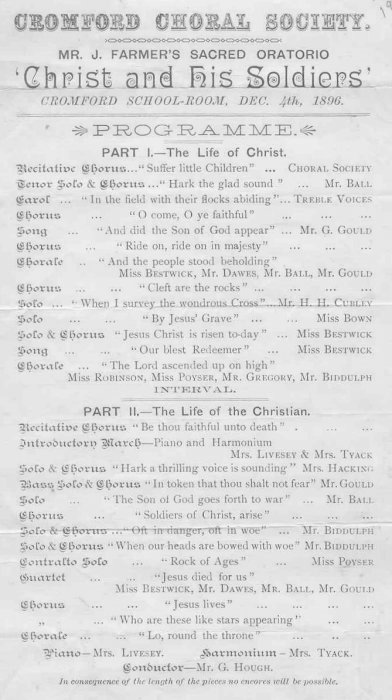
|
John Farmer (August 16, 1835 - July 17, 1901), from Nottingham, composed
oratorios, cantatas, and other church music, and chamber music. The
youngest of a large family, he was recognised as a child prodigy, and was
taught by his uncle Henry Farmer (1819-91), who was also a composer,
violinist and the owner of a music warehouse in Nottingham. After teaching
abroad for some years John became music master at Harrow in 1862 as a
result of being noticed while giving piano demonstrations at the London
International Exhibition of that year. At Harrow he composed school songs,
one of his best known being "Forty Years On" which he wrote in
1872 (Edward Ernest Bowen wrote the lyrics). He also composed cricketing
ditties like "Willow the King" one of the most famous of all
cricketing songs.
A work of his called "Cinderella" was performed at Harrow in 1883. When he
left Harrow he became Organist of Balliol College, Oxford, and founded the
Balliol Concerts. He championed the music of Bach, and his own oratorio
"Christ and His Soldiers" was popular with smaller
choirs. Most of Farmer's stage works were intended for amateurs, often
youngsters. His father, also John (1812 - 1894), was a Nottingham
lacemaker and a cellist. John Farmer was buried at St. Sepulchre's
Cemetery, off Kingston Road, Oxford.
Wikipedia
|
Likely entries in the Census for people mentioned:
Mr BALL,
Miss BOWN,
Miss BESTWICK,
Mr BIDDULPH,
Mr H.H.CUBLEY,
Mr DAWES,
G.GOULD,
Mr GREGORY,
Mrs HACKING,
Mr G.HOUGH,
Mrs LIVESEY,
Miss POYSER,
Miss ROBINSON,
Mrs TYACK.
An anonymous researcher writes:
Mr DAWES,
in the Choral Society had coal barges on the Cromford canal.
He lost his business (so I am told) by the corrupt manner in which
his men were sent off to war and not those of his competitor who then
bought him out. I believe that it was
Wheatcroft and
Key
who were in
charge of selecting men and it was the same men that made good through it.
|